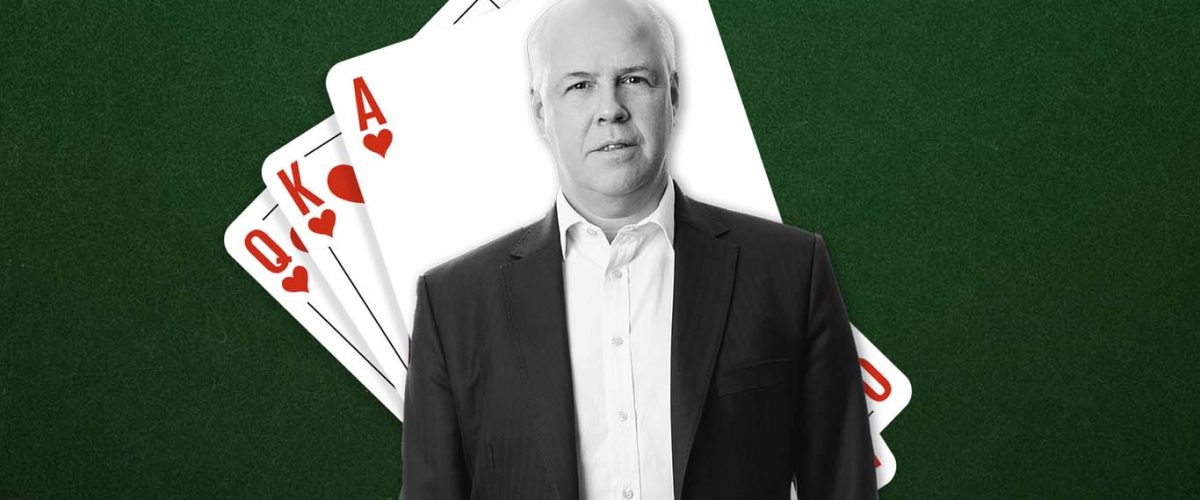Playing a winning handx
London Partner Philip Broke talks about his passion for bridge.
Had London Partner Philip Broke not chosen a career in law, he could have become an international bridge player.
Bridge is an intellectual card game. Played in pairs, players hold 13 cards each and compete to win as many ‘tricks’ as they can. The rules are complex and international matches can be completed over several days, making it an intense and heavily strategic bidding game.
Philip says: “I was born in Trinidad and my father played bridge a lot. My grandparents were also keen players, with my grandmother playing at international level for England while my grandfather was a tournament invigilator.
“In fact, I remember going to several tournaments where my grandmother would play against some of the best players in the world, including Jeremy Flint, Irving Rose and even film star Omar Sharif.
“I got the chance to watch the competitors play casually during breaks in the tournament, which got me interested in playing myself.
“So, at the age of nine, I asked my grandmother if she would teach me how to play. She wasn’t a big fan of children (even her grandchildren), so she refused, telling me to learn to play whist for two years before she’d help me.”
Philip took up the challenge. He says: “I don’t know why I agreed to it, but whist is similar to bridge without the bidding, so I played with my father and learnt the basics. Looking back, it gave me a foundation in the strategy of the game. Even now, I think my card play is better than my bidding and I think my grandmother had something to do with that.”
Philip’s knowledge of the game increased when he attended Eton at 13 and joined the bridge club.
He says: “I joined the team and it developed from there.
“Together with my friends, we’d often deal ourselves bridge hands one evening and bid on them at the back of our maths class the next day, as quietly as we could manage.
“To give you an idea of how obsessed I was, I had around 50 decks of cards while I was at school.”
Philip was a member of the Young Chelsea bridge club at Earl’s Court and, together with his playing partner, competed in several open tournaments during his school years, giving him the chance to play against top international players. He came third in one event, beating several internationals along the way.
He says: “My grandmother also assembled a team of top international players to take on my school team at Eton and, while we lost the first time, we beat them the next year, much to their annoyance.”
Philip went on to university at Cambridge where he continued playing and, while he never seriously considered playing bridge at professional level, he was offered the chance to partner West Indies cricket legend Everton Weekes in international competition.
Philip says: “I met Everton and several other former West Indies players at parties a friend of my father held during Test Matches at his flat overlooking Lord’s cricket ground.
“I got chatting to Everton who told me he was looking for someone to play as his regular international partner. He asked if I’d be interested.
“It was a spectacular offer, but I didn’t think I could match his ability to down whisky after whisky, so I declined for the sake of my health!”
One of Philip’s regular partners was fellow lawyer and Eton school mate John Cox, who Philip taught to play. John went on to become an England international and still plays professionally.
Philip says: “The fact that bridge is played in pairs adds to the intrigue, because you have to evaluate your opportunities, make good judgements, take criticism well and control yourself if you lose.
“You can’t communicate during bidding either, so it’s an art to read each other’s play.”
Philip took a break from bridge until his forties, when his sister bought him membership to the Young Chelsea bridge club as a birthday present.
Another little-known fact about Philip is that he was once offered the chance to play professional football in Italy.
He says: “When I was 20, I was on holiday in Sicily with my parents and got the chance to join training at the local team’s ground in Taormina.
“I performed so well that the chairman wanted to fly me to Rome to get me registered, but my father didn’t trust him and we flew home as planned, rather than extending our stay, so I could play on the Sunday.”
Philip also had the opportunity to appear with iconic British band, The Jam, when they invited him up on stage during a gig in Germany.
But it is bridge that has continued to be an enduring pastime and Philip and his wife, Natasha, now play monthly with Philip’s old university bridge partner, Tom, and his wife, Becca.
Philip says: “I love that bridge gives you the chance to challenge yourself intellectually.
“You need stamina because games can go on for over a day and you can’t afford to lose your concentration at any point.
“My grandfather died of a heart attack at the bridge table and my grandmother played into her 90s, so it’s something you can keep doing forever, regardless of age.
“I also love the social side of the game and, while I don’t have as much time to dedicate to bridge as I did at school and university, it continues to give me a lot of enjoyment.”





